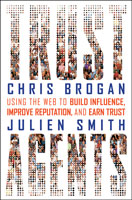Ten steps from Trust Agents to improve your social media engagement
20 September 2010 By Northern Lights

 What a great book – but I wish I had read this ages ago! Even though I am only halfway through Trust Agents by Chris Brogan and Julien Smith, I am already realising so many things we can tweak in our social media activities.
What a great book – but I wish I had read this ages ago! Even though I am only halfway through Trust Agents by Chris Brogan and Julien Smith, I am already realising so many things we can tweak in our social media activities.
The book starts slowly, especially if you are in PR. It covers the principles of being helpful and relevant to your contacts – which is second nature to most communicators – rather than ramming your company and products down people’s throats.
However, I really loved the thought-provoking story at the start. They talk about Joe Pistone who went undercover for the FBI in New Jersey as Donnie Brasco, a jewel thief. His initial moves were very subtle, just becoming a regular at Carmelo’s where the Mob hung out – but he never talked to them initially. Over months he became part of the scene, played backgammon and gradually started playing with the right people. He was known by them and ‘one of them’.
Of course, the message for those in social media is very clear. If you want to engage with others, hang out with them first – follow them on Twitter, follow their blogs, understand where they are coming from. Then you can make a few comments, offer help of some kind, get into conversation and from there relationships start forming.
The ten points I’ve taken (so far) from this book are
1. Don’t lose touch with your audience
As people start following your blog or tweets, there can become an ‘inflated sense of self-worth’. As they go up the social media ladder, they start to turn their backs on the people who got them where they are. I have to say, I’ve noticed this with a few social media ‘leaders’ – when you try and engage with them, they don’t actually have any personal touch any more. It’s all volume numbers and automated responses.
2. Get to know the newcomers
In the book, this is phrased as ‘raise up the newcomers, instead of sucking up to the industry top dogs’. Build relationships with the up and coming bloggers with smaller niche audiences.
3. Invest time in following others
Just as any good PR would research and get to know a journalist before selling in a story to them, so we should be doing with bloggers and others we want to engage with. Don’t dip in and out with odd comments, but follow them and when you make a comment it will be more relevant and useful.
4. Offer help
As you are following blogs and tweets, look for their requests for help, comments about not understanding a subject or wanting to know more about a topic. When it’s right, come in and offer help – not for the ‘return favour’ but to be genuinely helpful.
5. Remember the rarity of comments
We’ve mentioned before – it is hard work generating comments on a blog. If you are genuine, you can stand out when you start leaving comments. But don’t expect immediate responses. Hang out, become part of the scene before you’ll start getting comments back.
6. Don’t explicity mention your stuff
When you start making comments, don’t mention your product or company to start, even if relevant. Add some value to the post – not just, ‘nice post’.
7. Leave 10 comments today and 10 tomorrow
This might be a challenge unless you are full time in social media! But their tip to leave 10 comments today and tomorrow makes the point you can’t expect to do an odd comment here and there and for it to make an impact.
8. Bring wine to the picnic!
This book has such great phrases. They say too many companies jump into Facebook and Twitter and immediately peddle their wares. They forget the communities already know and understand each other and the new stranger arriving means everyone feels marketed to before they have been properly introduced.
9. Build meeting places
Build an online presence for a group that doesn’t yet have a place to belong. This is the first step to engaging a community.
10. Listen first, then small steps
Build your profile as someone known by being around and monitoring conversations, recognising who is a regular and who makes decisions. Offer to help people or host a get-together.
Thanks to Chris and Julien (the authors) – and can’t wait to get time to finish the book! Has anyone else read Trust Agents and what did you get from it?
